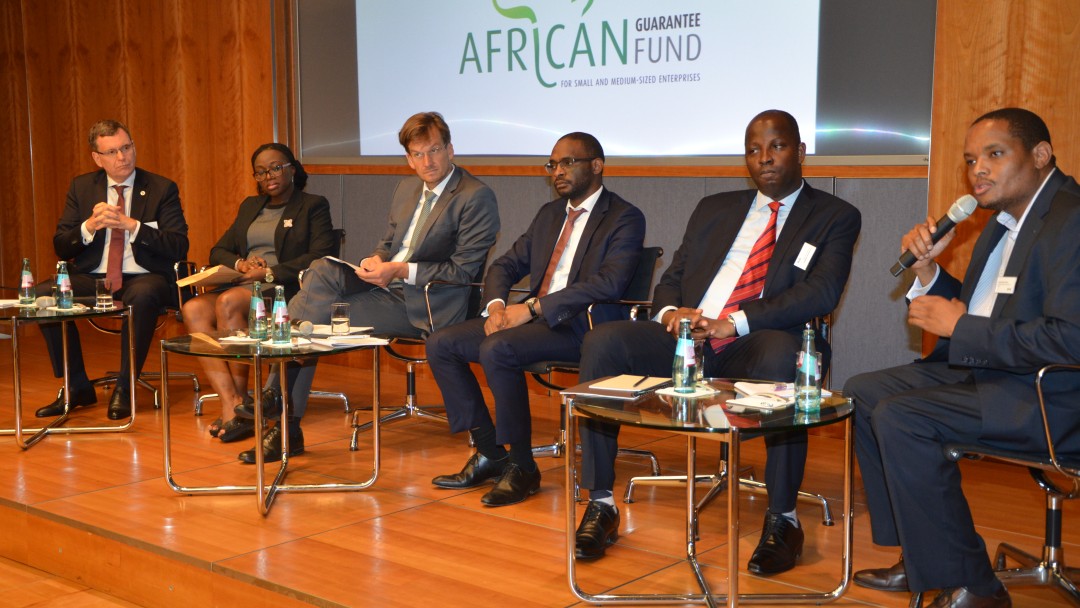News from 2017-07-25 / KfW Development Bank
Driving Africa's labour market
Driving Africa's labour market

A large proportion of jobs in Africa are created by small- and medium-sized companies. However, these businesses have very little access to loans to enable them to expand their enterprises. Representatives from African institutions that support small business owners through guarantee instruments met at KfW in Frankfurt in mid-July to share their experiences.
Small- and medium-sized enterprises in Africa often encounter difficulty when trying to access additional capital. Despite the fact they create 80 percent of jobs, they are slow to receive loans as banks perceive them to be high-risk clients. This is where guarantors come in, reducing the risk for banks who issue loans to small business owners. "These guarantee instruments are becoming increasingly important due to growing demand," explained KfW Managing Director Marc Engelhardt during his introduction.
Afolabi Obisesan introduced African Import-Export Bank (AFREXIMBANK), which was founded in 1993 and now has 44 members, the majority of which are African national banks. As well as KfW, its strategic partners include France's Agence Française de Développement (AFD). AFREXIMBANK issues loans, provides guarantees and protects loans, thereby promoting foreign trade in particular. Obisesan called upon financial institutions working in the field of development cooperation to increase their efforts with regard to guarantee instruments.
Jules Ngankam presented the African Guarantee Fund (AGF), a Cairo-based fund set up in 2011. It now has offices in 38 countries, works with over 90 financial service providers and has made USD 1 billion of funds available to small businesses. The aim of the fund is to bridge the gap between financial institutions and small and medium enterprises (SME). According to Ngankam, SMEs currently require capital in the amount of USD 150 billion, a demand which has yet to be covered. He explained that the high level of risk associated with this area was not the only reason behind the shortfall; the problem was also caused by a lack of understanding and resources. In light of this, AGF not only provides guarantee instruments, it also promotes capacity development, for example by providing advanced training for bank managers.
Risks are overestimated
Jules Ngankam explained that the perceived level of risk when issuing loans to smaller businesses is often higher than the actual risk in reality. "The risk can be reduced further by segmenting the portfolio," he explained. For instance, grouping customers into categories according to their risk level makes it easier to calculate the average risk for each segment. "Is the business formal or informal? How long has it been active?" He also added that the risk differed depending on the industry. "In addition, a distinction must be made between corporate risk and currency risk. Various hedging mechanisms can be used for each purpose."
Ronald Mpho Kubelo from Development Bank South Africa (DBSA) presented an example of a solution where his bank found a partner based in Mozambique to assume the local currency risk.
Representatives from KfW highlighted the fact that the bank was aware of the importance of local currency risks. They explained that the bank has developed instruments for this sector in the form of the African Local Currency Bond Fund (ALCB) and the Currency Exchange Fund (TCX). "KfW has already gained experience in the local area," reported Thomas Duve, Head of KfW's Southern Africa and Regional Funds department. "This is why we can now support partners like private energy suppliers, where the risks resulting from off-take agreements are cushioned by national network operators." He summarized: "The cost of guarantees will start to fall when we have gained more experience with guarantee instruments and moved further into this field of work."
Sustainability over maximum profits
Jules Ngankam once again highlighted the importance of creating jobs in Africa. "In the past, the governments were the most important providers of employment. However, in light of the large numbers of young people joining the labour market, they are now overwhelmed." SMEs have since taken over the role of most important employers. "If they can offer enough jobs, fewer young people will migrate," explained Ngankam, garnering him plenty of approval from the audience, many of whom were managers of African financial institutions.
When asked, Priscilla Budu of Eximguaranty in Ghana emphasised that her bank was not set on making a profit. "Our mandate is not to maximise profits but to ensure sustainability." She explained that a farmer who wished to take out a loan from a bank would have to pledge his estate. If he had one bad crop, the bank would ruin him. "Here at Eximguaranty on the other hand, we would give him time to pay back his loan. We are also happy to accept repayment in very low instalments." She explained that this would help the farmer to survive over the long term and slowly but surely increase his profits.

Share page
To share the content of this page with your network, click on one of the icons below.
Note on data protection: When you share content, your personal data is transferred to the selected network.
Data protection
Alternatively, you can also copy the short link: https://www.kfw-entwicklungsbank.de/s/enzBWrMC.BoMC
Copy link Link copied